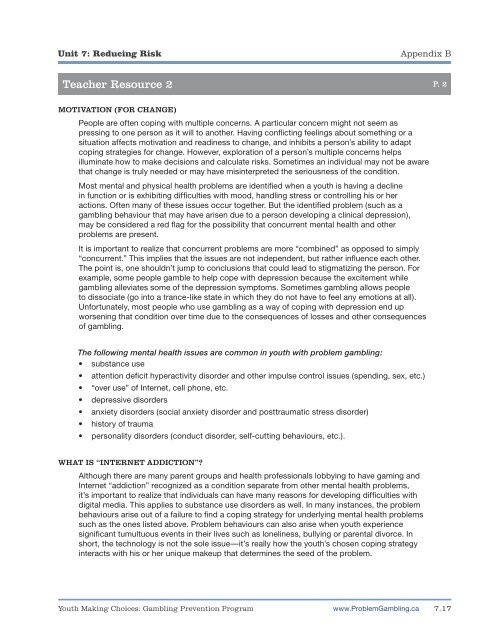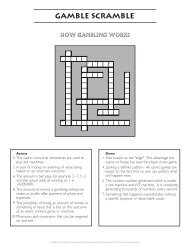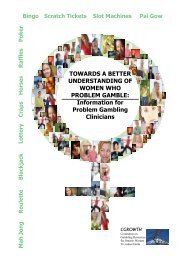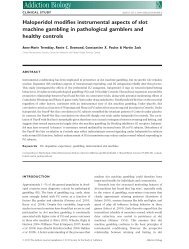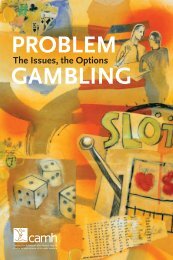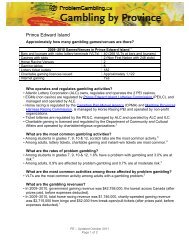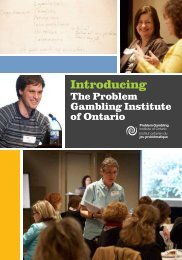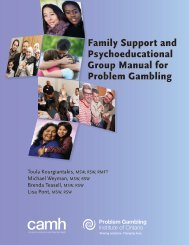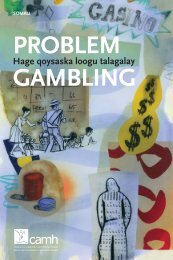Youth Making Choices: Gambling Prevention Program
Youth Making Choices: Gambling Prevention Program
Youth Making Choices: Gambling Prevention Program
You also want an ePaper? Increase the reach of your titles
YUMPU automatically turns print PDFs into web optimized ePapers that Google loves.
Unit 7: Reducing RiskAppendix BTeacher Resource 2 p. 2Motivation (for Change)People are often coping with multiple concerns. A particular concern might not seem aspressing to one person as it will to another. Having conflicting feelings about something or asituation affects motivation and readiness to change, and inhibits a person’s ability to adaptcoping strategies for change. However, exploration of a person’s multiple concerns helpsilluminate how to make decisions and calculate risks. Sometimes an individual may not be awarethat change is truly needed or may have misinterpreted the seriousness of the condition.Most mental and physical health problems are identified when a youth is having a declinein function or is exhibiting difficulties with mood, handling stress or controlling his or heractions. Often many of these issues occur together. But the identified problem (such as agambling behaviour that may have arisen due to a person developing a clinical depression),may be considered a red flag for the possibility that concurrent mental health and otherproblems are present.It is important to realize that concurrent problems are more “combined” as opposed to simply“concurrent.” This implies that the issues are not independent, but rather influence each other.The point is, one shouldn’t jump to conclusions that could lead to stigmatizing the person. Forexample, some people gamble to help cope with depression because the excitement whilegambling alleviates some of the depression symptoms. Sometimes gambling allows peopleto dissociate (go into a trance-like state in which they do not have to feel any emotions at all).Unfortunately, most people who use gambling as a way of coping with depression end upworsening that condition over time due to the consequences of losses and other consequencesof gambling.The following mental health issues are common in youth with problem gambling:• substance use• attention deficit hyperactivity disorder and other impulse control issues (spending, sex, etc.)• “over use” of Internet, cell phone, etc.• depressive disorders• anxiety disorders (social anxiety disorder and posttraumatic stress disorder)• history of trauma• personality disorders (conduct disorder, self-cutting behaviours, etc.).What is “Internet Addiction”?Although there are many parent groups and health professionals lobbying to have gaming andInternet “addiction” recognized as a condition separate from other mental health problems,it’s important to realize that individuals can have many reasons for developing difficulties withdigital media. This applies to substance use disorders as well. In many instances, the problembehaviours arise out of a failure to find a coping strategy for underlying mental health problemssuch as the ones listed above. Problem behaviours can also arise when youth experiencesignificant tumultuous events in their lives such as loneliness, bullying or parental divorce. Inshort, the technology is not the sole issue—it’s really how the youth’s chosen coping strategyinteracts with his or her unique makeup that determines the seed of the problem.<strong>Youth</strong> <strong>Making</strong> <strong>Choices</strong>: <strong>Gambling</strong> <strong>Prevention</strong> <strong>Program</strong>www.Problem<strong>Gambling</strong>.ca7.17


